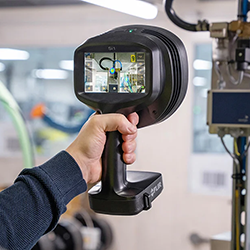Europe, Asia Lead the Way to the Factories of the Future
Concluding a year-long study, the World Economic Forum today announces nine of the most advanced factories in the world, recognizing the strides that the world’s best manufacturers are making towards embedding the technologies of the Fourth Industrial Revolution into modern production.
The geographic distribution of the nine “lighthouses” demonstrates that while Europe has struggled to produce its own home-grown internet giant, the region remains a powerhouse when it comes to applying advanced technology to manufacturing. Five of the “lighthouses” are located in Europe, three in China and one in the United States. They were selected from an initial list of some 1,000 manufacturing companies based on their successful implementation of Fourth Industrial Revolution technologies in ways that have driven financial and operational impact.
The aim of this effort is to build a network of “manufacturing lighthouses” to address problems confronting industries in both advanced and emerging economies when it comes to investing in advanced technologies. Earlier work by the Forum identified that over 70% of businesses investing in technologies such as big data analytics, artificial intelligence or 3D printing are not able to take the projects beyond pilot phase. To aid the learning and adoption of technologies by other companies, all nine lighthouses in the network have agreed to open their doors and share their knowledge with other manufacturing businesses.
“The Fourth Industrial Revolution is expected to deliver productivity gains and transform the future of manufacturing but we are still at the beginning of the journey” said Helena Leurent, Head of the Shaping the Future of Production System Initiative and Member of the Executive Committee at the World Economic Forum. “Our efforts to create a learning platform with the lighthouses as the cornerstone are part of the giant leap needed to capture the benefits for the larger manufacturing ecosystem including multinationals, SMEs, start-ups, governments and academia”.
“The Fourth Industrial Revolution is real. Workers and management equally get augmented with technology. These pioneers have created factories that have 20-50% higher performance and create a competitive edge,” said Enno de Boer, Partner and Global Head of Manufacturing at McKinsey & Company, which collaborated with the Forum on the project. “They have agile teams with domain, analytics, IoT and software development expertise that are rapidly innovating on the shop floor. They have deployed a common data/IoT platform and have up to 15 use cases in action. They are thinking ‘scale’, acting ‘agile’ and resetting the benchmark.”
The nine “lighthouses” have comprehensively deployed a wide range of Fourth Industrial Revolution technologies and use cases at scale while keeping humans and sustainability at the heart of innovation. One exciting example from each of the sites is highlighted below:
· Bayer, Division Pharmaceuticals (Garbagnate, Italy): ‘Digital solutions and leveraging data for significant productivity improvements’ - At a time of major volume growth for the site, utilized a Digital Twin based scheduling optimization to drive improvements throughout their Quality Control Lab
· Bosch Automotive (Wuxi, China): ‘Supporting output increase’ - By using advanced data analytics to deeply understand and eliminate output losses, simulate and optimize process settings, and predict machine interruptions before they occur
· Haier (Qingdao, China): ‘User-centric mass customization model’ – Artificial Intelligence led transformations include an ‘order-to-make’ mass customization platform and a remote AI supported, intelligent service cloud platform to predict maintenance needs before they happen
· Johnson & Johnson DePuy Synthes (Cork, Ireland): ‘Process driven digital twin’ - The factory has used internet of things technology to create digital representations of physical assets leading to advanced machine insights, resulting in lower operating costs and a reduction in machine downtime
· Phoenix Contact (Bad Pyrmont and Blomberg, Germany): ‘Customer-driven digital twinning’ - By creating digital copies of each customer’s specifications, production time has been cut by 30%
· Procter & Gamble (Rakona, Czech Republic): ‘End-to-end synchronization’ - Web based analytical model allowed simulation, agility and responsiveness across the supply chain, resulting in improved speed to market, inventory efficiency and customer satisfaction uplift of 116%
· Schneider Electric (Le Vaudreuil, France): ‘Smart and integrated factory’ - Empowering operators to have increased visibility into operations, maintenance, and energy use and sharing these best practices across sites, has helped maximize energy and operational efficiencies, reducing energy costs by 10% and maintenance costs by 30%
· Siemens Industrial Automation Products (Chengdu, China): ‘Fully integrated technology platform for flexible production’ - Delivers ability to take customer orders and immediately allocate resources and schedule production time on a single, automated platform leading to 100% quality compliance and 100% traceability, while ensuring security and agility
· Fast Radius with UPS (Chicago, IL): ‘Accelerating innovation’ - Meeting increasing demand for fast-turnaround and mass customization of products through distributed, industrial-grade 3D printing and proprietary operating system that drives real-time analytics and orchestrates, design, production and global fulfilment
The network of “manufacturing lighthouses” will officially launch at the World Economic Forum’s 12th Annual Meeting of the New Champions, which will take place on 18-20 September 2018 in Tianjin, People’s Republic of China. Convening under the theme, Shaping Innovative Societies in the Fourth Industrial Revolution, nearly 2,000 business leaders, policy-makers and experts from over 80 countries will participate and explore more than 200 sessions over the three days of the meeting.
The network of “manufacturing lighthouses” will continue to grow and companies will have the opportunity to propose additional sites as we build up to the World Economic Forum’s Annual Meeting 2019 in Davos.
Comments (0)
This post does not have any comments. Be the first to leave a comment below.
Featured Product

